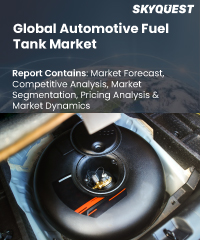
Report ID: SQMIG25A2161

Report ID:
SQMIG25A2161 |
Region:
Global |
Published Date: November, 2024
Pages:
157
|
Tables:
61 |
Figures:
75
Automotive Fuel Tank Market Drivers
Growing Demand for lightweight vehicles is Expected to Drive the Market Growth
Automotive Fuel Tank Market Restraints
Increasing Adoption of Electric Vehicles is Anticipated to Restraint the Growth of the Market
Our industry expert will work with you to provide you with customized data in a short amount of time.
REQUEST FREE CUSTOMIZATIONWant to customize this report? This report can be personalized according to your needs. Our analysts and industry experts will work directly with you to understand your requirements and provide you with customized data in a short amount of time. We offer $1000 worth of FREE customization at the time of purchase.

Report ID: SQMIG25A2161